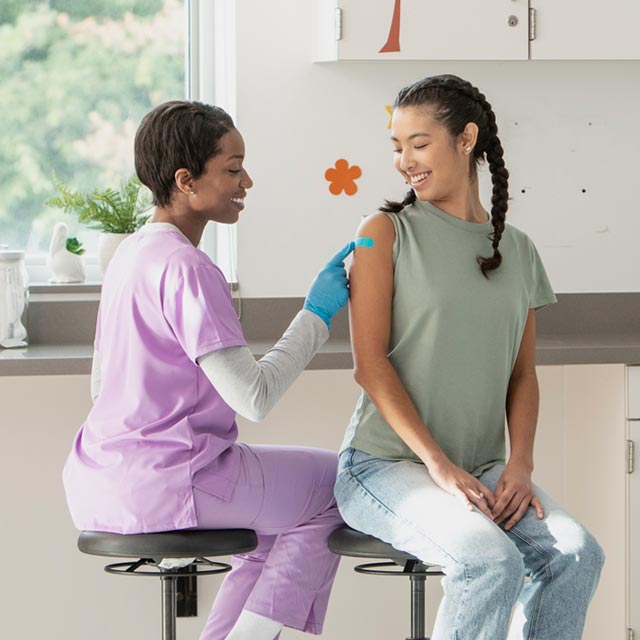
An adverse event is an undesirable effect that happens after vaccination.source: 1 Adverse reactions can be common or rare. They can also be mild or serious.
- Common adverse reactions are also called side effects and can include soreness where the vaccine was given, a fever, or body aches. These side effects usually go away on their own within a few days.source: 1
- Serious adverse reactions, which are rare, can include allergic reactions. Even more rare are life-threatening illnesses and permanent disabilities.source: 1,source: 2
- Most adverse reactions, often called side effects, are not serious. Many people who get a vaccine will have no side effects. For those who do, the majority are mild to moderate and include soreness where the vaccine was given, a fever, or achiness.source: 3 These usually go away on their own within a few days.source: 3
- Serious adverse reactions are rare. Few things in this world are without some level of risk. And that is true for vaccines, too. But the risk of a serious adverse reaction from a vaccine is extremely low. It varies from vaccine to vaccine but, in general, is about 1–2 in 1 million doses.source: 4 You are 65x more likely to be struck by lightning than to have a vaccine-related adverse event.source: 5
- It is far more likely to have serious symptoms from the disease than a serious adverse reaction from the vaccine that prevents the disease.source: 4 For instance, almost every person with tetanus will need to be hospitalized, and 10%–20% of people with tetanus will die.source: 6,source: 7 However, the tetanus vaccines have a risk of serious allergic reaction in 1–2 doses per 1 million.source: 7,source: 8
Key Evidence
- Safety of vaccines is continuously monitored.source: 4 Vaccines go through a rigorous process to be approved for use.source: 9 But the safety net does not stop there. Vaccines are monitored for as long as they are used.source: 9 Potential adverse events are identified through a series of safety-monitoring systems, and any potential concerns are investigated by qualified scientists.source: 1 This is how we know that serious side effects are rare.
- The Vaccine Adverse Event Reporting System, or VAERS, collects information about potential adverse events. VAERS is a system managed by the U.S. Centers for Disease Control and Prevention (CDC) and the U.S. Food and Drug Administration (FDA) that helps identify possible safety issues. Anyone can report a potential adverse event after vaccination.source: 10 An adverse event is any event that happens after a person is vaccinated. Not all adverse events happen because of vaccination. In other words, just because someone submitted a VAERS report does not always mean there is a safety issue with a vaccine.source: 10 For example, someone may have a headache after their vaccine. The headache may have nothing to do with the vaccine. But if a person is unsure what caused a health issue following a vaccine, then they should report it to VAERS. Medical and scientific experts evaluate VAERS reports to identify potential vaccine safety concerns.source: 11
- VAERS is a system managed by CDC and the FDA that helps identify possible safety issues. Anyone can report potential side effects. A VAERS report does not always mean there is a safety issue. For example, someone may have a headache after their vaccine. The headache may have nothing to do with the vaccine. But if a person is unsure what caused a health issue following a vaccine, they should report it to VAERS. Researchers evaluate VAERS reports to identify potential vaccine safety concerns.source: 11
- Side effects that occur long after vaccination are rare.source: 4 Some parents have a concern, particularly with newer vaccines, that serious long-term effects might not be known for months or even years. But we know from many decades of intense vaccine monitoring that long-term side effects from vaccines are rare. So safety is well known by the time the vaccine clinical trials are over.source: 12

A Deeper Dive: Correlation, Causality, and Serious Adverse Events
When it comes to health and medicine, it’s sometimes hard to understand the difference between correlation and causation.
Causation is when one thing leads to another thing happening. For example, a measles infection is known to cause a blistery rash in many patients.source: 13 Or we know that cigarette smoking is known to cause lung cancer, especially in many longtime smokers.source: 14
Correlation is when one thing happens around the same time as or following another, but one did not necessarily cause the other to happen. For example, a toddler may fall down after being vaccinated and the parent worries the vaccine affected the child’s balance. But the more likely reason for the tumble is that at the same time toddlers are being vaccinated they are also learning to walk, and therefore fall down frequently.
People may link negative health issues to vaccinations because they happen around the time vaccines were given.source: 1 For instance, some people have concerns that vaccines can cause autism. Rigorous studies have proven that vaccines have nothing to do with autism.source: 15
Autism is often diagnosed in early childhood when children get their first routine vaccines.source: 16 But if vaccines truly caused autism, there would be many more people with autism. More than 9 out of every 10 children in the United States get their vaccines on time for kindergarten.source: 17 Not even 1 out of every 10 children have an autism diagnosis.source: 18 For more information about how we know vaccines do not cause autism, read the answer to How do I know vaccines are safe for my child?
Scientists thoroughly test vaccines before they become available to the public.source: 19 Even after people start getting vaccinated, scientists continually monitor safety data to determine whether a health issue correlated with a vaccine is actually caused by the vaccine.source: 19 Research confirms that the vaccines children and adults get in the United States are safe.source: 19,source: 20
More information
- History of Vaccines: Vaccine Side Effects and Adverse Events
- Official Journal of the American Academy of Family Physicians: Vaccine Adverse Events: Separating Myth from Reality
Still have questions? Talk to your child's doctor, nurse, or pharmacist.
Sources
- CDC: How Vaccine Safety Monitoring Works
- CDC: Submitting a Vaccine Adverse Event Reporting System (VAERS) Report and Using VAERS Data
- CDC: Possible Side Effects from Vaccines
- HHS: Vaccine Side Effects
- National Weather Service: How Dangerous is Lightning?
- CDC: About Tetanus
- CDC: Tdap (Tetanus, Diphtheria, Pertussis) VIS
- FDA: Vaccines Licensed for Use in the United States
- CDC: Developing Safe and Effective Vaccines
- CDC: About the Vaccine Adverse Event Reporting System (VAERS)
- HHS: VAERS Data
- FDA: Vaccines Protect Children From Harmful Infectious Diseases
- CDC: Measles Symptoms and Complications
- CDC: Lung Cancer Risk Factors
- CDC: Autism and Vaccines
- CDC: Screening for Autism Spectrum Disorder
- CDC: Vaccination Coverage by Age 24 Months Among Children Born During 2018–2019 — National Immunization Survey–Child, United States, 2019–2021
- CDC: Autism Prevalence Higher, According to Data from 11 ADDM Communities
- CDC: How Vaccines are Developed and Approved for Use
- Annals of Internal Medicine: Postmarketing Safety of Vaccines Approved by the U.S. Food and Drug Administration
Disclaimer Policy: Links with this icon () mean that you are leaving the HHS website.
Disclaimer Policy: Links with this icon () mean that you are leaving the HHS website.
- The Department of Health and Human Services (HHS) cannot guarantee the accuracy of a non-federal website.
- Linking to a non-federal website does not mean that HHS or its employees endorse the sponsors, information, or products presented on the website. HHS links outside of itself to provide you with further information.
- You will be bound by the destination website's privacy policy and/or terms of service when you follow the link.
- HHS is not responsible for Section 508 compliance (accessibility) on private websites.
- For more information on HHS's web notification policies, see Website Disclaimers.
